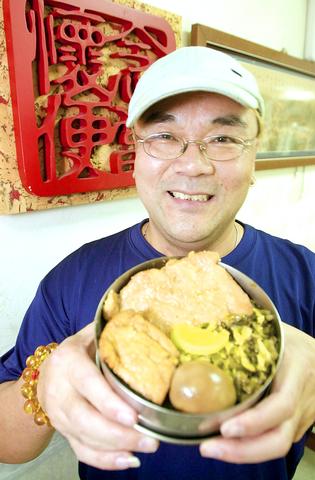For renowned moviemaker and now traditional lunchbox vendor Chen Ang-chun (
While he failed to survive Taiwan's dying movie business he has turned a dollar in an unlikely occupation, selling lunchboxes.

PHOTO: GEORGE TSORNG, TAIPEI TIMES
"The lunchbox business has little to do with the nation's economic prosperity since people have to eat everyday," Chen, owner of the Nostalgic Lunchbox (
Then the phone rang and orders arrived, the 48-year old Chen kicked off his busiest hours by sending out lunchbox deliveries to the office-working class.
"With eight chain stores in greater Taipei, over 3,000 lunchboxes are sold per day," Chen said. At NT$65 per lunchbox, Chen takes in NT$200,000 per day or NT$4 million in monthly revenues -- better than he fared at making movies.
When he was in his 20s, Chen entered the film industry working as a painter for movie signboards and later made movies himself, investing in dozens of films. More recently, he put down his life-long savings producing the award-winning movie Such a Life (一隻鳥仔哮啾啾), which won the best film award in 1997 Asia-Pacific Film Festival.
However, the showing at the box office was poor and Chen was broke.
When the industry headed south for several years, Chen had little choice but to find other work.
"The domestic film industry is dead. No one wants to go to Taiwanese movies when you've got Hollywood movies," he recalled.
But still, movie-making is his dream.
"Making movies can get you so addicted that I think about it all the time even after having lost hundreds of millions of dollars in the business," Chen sighed, adding that he will return to the art form if he has the opportunity.
To support his movie-making crew, including directors and producers, Chen started his lunchbox business last June in memory of the 1940s well-known railway lunchbox from Toufen in Miaoli County where he used to visit his former girlfriend several decades ago.
At that time, Toufen railway lunchboxes were so famous that even the late president Chiang Ching-kuo (
Sticking to the original flavor, Chen insisted on using fresh ingredients for his single-selection lunchbox business. The old-fashioned stewed pork, egg, tofu and pickled cabbage pack Chen's wooden-container or tin-container lunchboxes. Yet the taste is never old-fashioned, instead, customers say, it is just like home cooking.
"The pork is so well cooked and very tasty," said Hung Yu-ju (洪于茹), a 22-year-old female college student, who yesterday patronized Chen's store.
"It's a very homey taste," she added.
The homey taste, moreover, attracts daily patrons.
"Basically, I come here to eat a meal everyday, five days a week," said a 23-year-old student, surnamed Kung (
"They give good value for the money," he added.
With his initial success, Chen later took over several coffee shops, which failed to survive the economic downturn, at a very good discount, taking advantage of existent kitchenwares and decor.
With some minor refurnishing, these new stores were ready to serve coffee, tea and set meals in addition to traditional lunchboxes.
Further eyeing China's market, Chen has visited Shanghai a few times, planning to branch out there.
"Shanghai people's consumption power is getting stronger and stronger; they can afford to buy lunchboxes priced between 10 to 12 yuan," Chen said, adding that the expected net profit in Shanghai may be higher than that in Taiwan.
Chen added that he also noticed that Chinese are fond of Taiwanese products.

Taiwanese suppliers to Taiwan Semiconductor Manufacturing Co. (TSMC, 台積電) are expected to follow the contract chipmaker’s step to invest in the US, but their relocation may be seven to eight years away, Minister of Economic Affairs J.W. Kuo (郭智輝) said yesterday. When asked by opposition Chinese Nationalist Party (KMT) Legislator Niu Hsu-ting (牛煦庭) in the legislature about growing concerns that TSMC’s huge investments in the US will prompt its suppliers to follow suit, Kuo said based on the chipmaker’s current limited production volume, it is unlikely to lead its supply chain to go there for now. “Unless TSMC completes its planned six

Intel Corp has named Tasha Chuang (莊蓓瑜) to lead Intel Taiwan in a bid to reinforce relations between the company and its Taiwanese partners. The appointment of Chuang as general manager for Intel Taiwan takes effect on Thursday, the firm said in a statement yesterday. Chuang is to lead her team in Taiwan to pursue product development and sales growth in an effort to reinforce the company’s ties with its partners and clients, Intel said. Chuang was previously in charge of managing Intel’s ties with leading Taiwanese PC brand Asustek Computer Inc (華碩), which included helping Asustek strengthen its global businesses, the company

Power supply and electronic components maker Delta Electronics Inc (台達電) yesterday said second-quarter revenue is expected to surpass the first quarter, which rose 30 percent year-on-year to NT$118.92 billion (US$3.71 billion). Revenue this quarter is likely to grow, as US clients have front-loaded orders ahead of US President Donald Trump’s planned tariffs on Taiwanese goods, Delta chairman Ping Cheng (鄭平) said at an earnings conference in Taipei, referring to the 90-day pause in tariff implementation Trump announced on April 9. While situations in the third and fourth quarters remain unclear, “We will not halt our long-term deployments and do not plan to

The New Taiwan dollar and Taiwanese stocks surged on signs that trade tensions between the world’s top two economies might start easing and as US tech earnings boosted the outlook of the nation’s semiconductor exports. The NT dollar strengthened as much as 3.8 percent versus the US dollar to 30.815, the biggest intraday gain since January 2011, closing at NT$31.064. The benchmark TAIEX jumped 2.73 percent to outperform the region’s equity gauges. Outlook for global trade improved after China said it is assessing possible trade talks with the US, providing a boost for the nation’s currency and shares. As the NT dollar